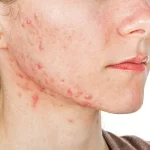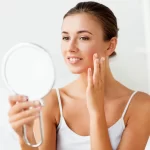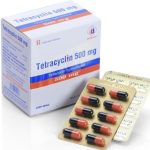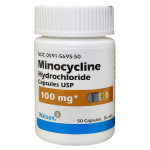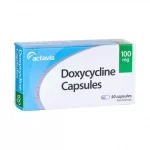Classified as a severe type of acne, nodular acne can be painful, uncomfortable, and embarrassing, especially if it appears on your face. Nodules are more difficult to deal with than more mild types of acne like blackheads or whiteheads, papules or pustules. It is possible, however to treat nodules before they worsen and become cystic acne. If you understand some of the possible causes of nodules, you can begin to also understand potential treatments for the condition too.
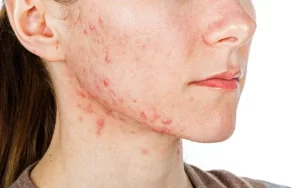
Nodular Acne: What is It?
Nodular acne is a type of inflamed outbreak. Nodules develop from when mild to moderate papules and pustules rupture deep within the skin affecting the dermis layer of the skin. When this happens, a lesion forms, hardens, and creates firm to hard nodular acne. The nodule looks like a pimple absent of a head. It can be red, and it may or may not be painful to the touch. Nodules, when not dealt with, can harm tissues in and around the formation: this can lead to the development of cystic acne or it can eventually create unsightly acne scar tissue. Nodular acne can be accompanied by the presence of other acne eruptions, and they are often the sign of a long lasting, enduring, untreated acne condition.
Potential Causes
There are several causes believed to be behind the onset of nodules. Nodules can form due to the excess production of oils or sebum in the skin. This oily substance can cause pores to become filled with oil as well as dirt and dead skin cells. The pores clog and the interior of the pore becomes a breeding ground for acne-causing bacteria. When an infection develops deep below the surface of the skin, a nodule is the end result.
Some people may develop nodule acne as a secondary symptom associated with inadequate exercise and nutrition. When the body does not get the right nutrients then the body does not operate at peak performance. A person’s immune system may not be as responsive to infections as it should be and the skin may demonstrate the weakened immune system functions with the appearance of different forms of acne. If the lack of adequate nutrition is long term, nodular acne can appear. Meanwhile, not getting enough exercise can eventually lead to a buildup of undesirable toxins in the body as well as the skin. These toxins can eventually lead to the development of acne outbreaks.
Genetics plays some role in whether or not you will develop nodular acne or other acne formations. If your mother, father, brothers, or sisters have dealt with acne related conditions, it is highly likely that you will have to deal with similar skin conditions. Meanwhile, some acne conditions are caused by hormonal imbalances in the body, while other acne conditions are caused by environmental conditions or exposures; for instance, the overuse of some cosmetics can contribute to chronic outbreaks.
Nodular Acne Treatment
When dealing with nodules, it will be important for you to get to the root of the cause: the underlying skin infection. The use of creams and ointments on the skin’s surface can help reduce inflammation and swelling, and it may even kill off acne causing bacteria on the surface of the skin, but you will need to also treat the infection that is deep within the skin too.
A dermatologist will often approach the situation by offering you a course of antibiotics that you can take orally for a period of two to twelve weeks. Oral antibiotics can stop the growth of bacteria deep within the skin, and it can prevent the infection from spreading to other parts of the skin too. Antibiotics are not a cure for acne conditions and it is possible that you will experience issues with acne in the future, but it can help get a severe acne eruption under control with greater ease.
It can take weeks for nodular acne to dissipate, even with the best antibiotic treatments. It is important for you to remain patient and to refrain from trying to pick or pop the formation. If you pick at nodular acne, you run the risk of forcing any infection deeper into the dermis, spreading the infection, and prolonging the condition. In addition, picking at nodular acne can force the formations to progress into painful and difficult to treat cystic formations.
It is entirely possible to prevent the appearance of nodular acne if you deal with outbreaks as soon as they occur. You do not want to let pustules and papules to progress into painful, unsightly nodules with the potential of destroying skin cells and creating scar tissue. Keeping the skin clean and using antibacterial gels or soaps can minimize the appearance of papules and pustules, while keeping the potential for the appearance of nodules at bay.
Some people experience nodular acne that requires more aggressive treatment. Laser treatments have been used in the past to successfully deal with these painful skin eruptions; a doctor uses a laser tool that heats up cells in and around the nodule. The use of the laser causes the glands in the skin to create less oil and it helps to remedy any potential scarring at the same time. Chemical peels, dermabrasion, and collagen injections have also been used to deal with the scars that commonly follow the appearance acne nodules.

